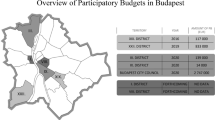
Overview
- Provides empirical evidence to show how democratic experiments are harnessed to achieve control and support authoritarianism
- Argues that the exertion of dominance through a participatory form reflects the development of governance capability of China as a modern authoritarianism
- Is of interest to readers interested in the field of comparative politics, democratization, authoritarianism, and China studies
Access this book
Tax calculation will be finalised at checkout
Other ways to access
About this book
This book provides empirical evidence to show how democratic experiments are harnessed to achieve control and support authoritarianism, through the lens of participatory pricing, which is one of the most important forms of deliberative democracy in China. The crucial point is an interlacement of easily perceptible improvement in empowerment (voluntary enrollment, disclosure of information and opportunities for expression during events) and hidden control (delicately designed procedures and pre-existing frameworks that influence participants in how they think, and when they talk).
The mixture of these two mechanisms assures participants and educates them, producing cooperative citizens desired by the government. This is referred to as the partial empowerment strategy, which challenges the traditional assumption of the correlation between deliberation and empowerment. When authoritarian control influences deliberations in a form that obstructs the natural developmental process of empowerment, it acts as a filter that encourages only some form of empowerment, but precludes those that are too risky for the government. This exertion of dominance through a participatory form reflects the development of governance capability of China as a modern authoritarian state and explains its “surprising” resilience.Similar content being viewed by others
Keywords
- Deliberative Initiatives in China
- Participatory Pricing in China
- Dilemmas of Empowerment in China
- Authoritarian Deliberation
- Authoritarian Deliberation in China
- Deliberative Democracy in China
- Authoritarian Resilience
- Authoritarian Resilience in China
- Political Demobilization
- Political Demobilization in China
- Pricing Policy in China
- Pricing Policy
- Limited Empowerment in China
- Limited Empowerment
- democracy
Table of contents (6 chapters)
Reviews
“This is an excellent study of a set of democratic practices, established by Chinese government, to manage the impact of the transition to a market economy on citizens and businesses: participatory pricing. Xuan Qin’s careful and methodologically wide-ranging analysis provides fascinating insight into the ways in which participatory pricing’s democratic implications are curated and limited by China’s authoritarian state. It is essential reading for anyone interested in the fuzzy boundary between democracy and authoritarianism.”
–Dr. Catherine Owen, British Academy Postdoctoral Fellow, Department of Politics, University of ExeterAuthors and Affiliations
About the author
Bibliographic Information
Book Title: Reinforcing Authoritarianism Through Democracy
Book Subtitle: Participatory Pricing in China
Authors: Xuan Qin
DOI: https://doi.org/10.1007/978-981-33-4956-8
Publisher: Palgrave Pivot Singapore
eBook Packages: Political Science and International Studies, Political Science and International Studies (R0)
Copyright Information: The Editor(s) (if applicable) and The Author(s), under exclusive license to Springer Nature Singapore Pte Ltd. 2021
Hardcover ISBN: 978-981-33-4955-1Published: 26 January 2021
Softcover ISBN: 978-981-33-4958-2Published: 27 January 2022
eBook ISBN: 978-981-33-4956-8Published: 25 January 2021
Edition Number: 1
Number of Pages: XI, 96
Number of Illustrations: 2 b/w illustrations
Topics: Governance and Government, Democracy, Asian Politics



